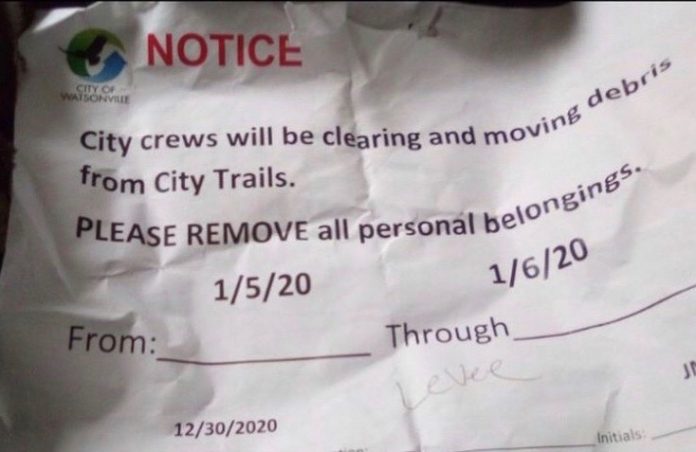WATSONVILLE—Scheduled clean-ups of the Pajaro River Levee have been postponed indefinitely after homeless advocates raised concerns about displacing people living there, according to Watsonville City Manager Matt Huffaker.
Huffaker said a regularly scheduled clean-up of the levee was set for Tuesday and Wednesday. That was canceled Monday after advocates complained to City leadership that a clean-up could displace homeless residents from the levee and contribute to the spread of Covid-19 in the community.
“The goal is to remove the trash and debris from the area but not to displace folks at this time particularly under the Covid environment that we’re operating under,” Huffaker said Wednesday. “We’ve discontinued that work for now just to try to ensure that no one is having to relocate or be disrupted while we try to hunker down and get everyone through these tough weeks with a spike in cases.”
As of Tuesday, there were more than 2,500 active Covid-19 cases in Santa Cruz County. Watsonville has been the most-impacted city in the county, as more than half of roughly 9,800 cases have been identified here.
News of the clean-ups spread on social media Sunday through an Instagram account named agentsofchange831. In a post, that user said the Monterey County Sheriff’s Office and Smith & Enright Landscaping on Dec. 7 bulldozed the shelter erected by the people living in the Monterey County side of the levee. That post also said the City was planning to “sweep more of the Pajaro River community” on Tuesday and Wednesday, and asked for volunteers to help defend the residents’ shelters.
Monike Tone said roughly 40 people showed to the levee on Tuesday and many returned Wednesday to help protect the community from a possible sweep.
“I’m truly grateful for the support that we’ve received from everyone,” she said.
Tone said that she has lived in the Pajaro River community for eight years and that many of her fellow residents, around 110 people, she said, have been there for anywhere from two to three years. In that time, the residents constructed wooden shelters, gardens, chicken coups and water filtration systems.
All of that, including 58 structures, was demolished during the Monterey County Sheriff’s sweep of the camps in their jurisdiction, she said. That night, Tone said she slept in the rain and cried for most of the night.
“I did not know where to turn, I did not know who to talk to,” she said.
Tone said she attended the Stop the Sweeps rally in Santa Cruz last week where she met local organizers who have helped raise awareness of her community’s issues, which she said have gone largely unnoticed by local political leaders.
“I’d like to thank all the voices that have been able to make a difference and are trying to change,” she said. “I think this year is going to cause a lot of greatness for the homeless community because we’re not going to stop until we receive the respect and dignity we deserve.”
Huffaker said City crews have performed clean-ups of the levee and other natural habitat around the city as recently as last week. He said the City performs those clean-ups—clearing garbage, illegally dumped furniture and abandoned shopping carts, among other things—to “ensure environmentally sensitive areas are being protected.”
The clean-ups at the levee, Huffaker said, are particularly important as rain has started to hit the Central Coast.
“It’s always a particular concern during the winter months where those areas are prone to flooding during heavy rains,” he said. “We’re trying to balance public health with also preserving and maintaining these environmental areas. We’ll continue to monitor as we go forward and make adjustments as necessary.”
Huffaker said City crews typically post advanced notices of clean-ups a few days before they begin the work. They also sometimes give people living in natural habitat verbal notices, Huffaker said.
Those crews are sometimes accompanied by a Watsonville Police Department officer for protection, he said. Those officers and City employees also try to connect homeless residents with resources available to them through local nonprofits and the County of Santa Cruz.
“Ideally, we would want these individuals to be connected to resources and [be] in a warm bed where they can safely weather the storm and the pandemic,” Huffaker said.
But Tone says that those resources are often unavailable or undesirable. One example, she said, is the current emergency homelessness shelter at the Veterans Memorial Building in Watsonville, which provides congregate shelter for those experiencing homelessness. Tone said that shelter is not only constantly full, but does not provide a safe environment for people looking to stay warm and evade possible exposure to Covid-19.
“They’re not reliable resources, they’re not resources that work, they’re not resources that can help us at any point in time,” she said. “Us going into shelter where there has been Covid already, that’s unacceptable to us.”








